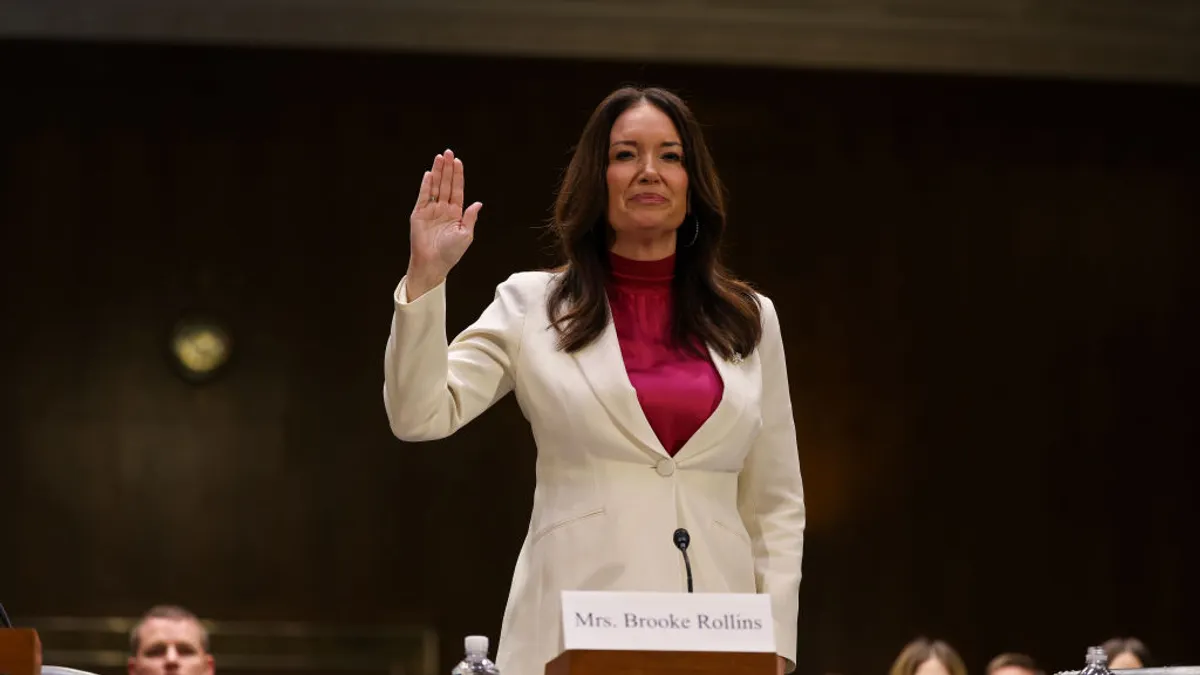With farm bill negotiations at a standstill, congressional leaders are working to extend current legislation with billions of dollars in financial aid for farmers to weather an economic downturn.
Two critical deadlines are coming in the next two weeks. Farm bill safety net programs will begin to expire and revert back to Depression-era law on Dec. 31, upending food markets and raising consumer prices. At the same time, lawmakers face a Dec. 20 deadline to keep the government funded and avoid a partial shutdown.
Lawmakers hope to include a farm bill extension within the upcoming government funding bill, with House Republicans proposing to use $10 billion in disaster assistance and provide one-time economic payments for farmers.
While Democrats also want to provide economic relief for farms, the party has been resistant to siphoning disaster relief assistance to pay for it.
Here's a breakdown of the talks:
Should disaster or conservation funds being used for farm aid?
House Republicans on Tuesday released its final proposal for an economic aid package as part of the farm bill extension. The plan would divert some of the $100 billion in emergency disaster aid requested by the Biden administration in the wake of Hurricanes Helene and Milton.
Around $30 billion in the disaster assistance funds would be allocated for farms, with $20 million dedicated to helping farms recover from devastating weather events throughout the last two years. The remaining $10 billion would be used to provide a one-time economic payment for farms.
Farms can qualify for aid if the gross return for an eligible commodity is less than the expected cost of production, according to the draft text. The amount of assistance provided will be calculated by multiplying a farm's economic loss by the number of acres, with the payment equalling 26% of that final number.
Beyond economic aid, Republicans' proposal also includes a provision allowing for year-round sales of E15 ethanol, a move that could expand markets for struggling corn producers.
"We think we're giving [farmers] a big boost of relief at exactly the right time, in the nick of time, frankly," House Speaker Mike Johnson told reporters on Tuesday.
Democrats have bristled at plans to reshuffle disaster assistance, instead proposing to shift conservation funding from the Inflation Reduction Act to allow for $10 billion in economic assistance for farmers. The IRA allocated close to an additional $20 billion over five years for farmers to adopt climate-friendly production practices, though divisions over the conservation funds have been one of the major holdups in farm bill negotiations.
Republicans have been resistant to using IRA funds to pay for economic aid after Trump vowed to repeal unspent dollars under the bill.
Agriculture leaders on both sides of the political aisle were quick to trade barbs, accusing the other party of rejecting much-needed economic assistance for farmers that faced deteriorating economic conditions without an updated safety net.
“Republican Leadership turned down this $10 Billion proposal, rejecting needed economic assistance and increased conservation spending for decades," Sen. Debbie Stabenow and Rep. David Scott, leading Democratic negotiators for the farm bill, said in a joint statement. "It is important to stress that this proposal is paid for and does not take any funding away from the critical natural disaster aid that has been requested."
Republican negotiators, meanwhile, said Democratic leaders in the House and Senate are "failing to provide our farmers with the economic assistance they need."
No extension without economic aid, farm groups say
The American Farm Bureau Federation and other powerful agricultural groups are pushing lawmakers to vote for Republicans' economic aid proposal, adding that any farm bill extension must include financial relief.
Farm groups worry that another extension of the 2018 farm bill would leave farmers with outdated legislation that was written prior to the pandemic and doesn't address the changing needs of producers. Tumbling crop prices, rising expenses and a decline in government aid have all contributed to a downturn in the farm economy.
“There is no doubt in my mind that for many farmers, the critical funding in this bill could make the difference between planting a crop next year and giving up," AFBF President Zippy Duvall said in a statement.
Financial assistance is vital to ensuring farm operations can stay cash positive and acquire loans to weather the economic downturn. Banks are more hesitant to lend to farms as demand for loans skyrockets to a 11-year high, with many tightening policies.
“Legislation to provide financial assistance to producers, many of whom have had consecutive years of production losses due to low commodity prices, is necessary to enable producers to show positive cashflows in their operations as they seek bank loans for the year ahead," Rebeca Romero Rainey, president and CEO of the Independent Community Bankers of America, said in a statement.
This story has been updated to include Republicans' final proposal for farm economic aid.



















